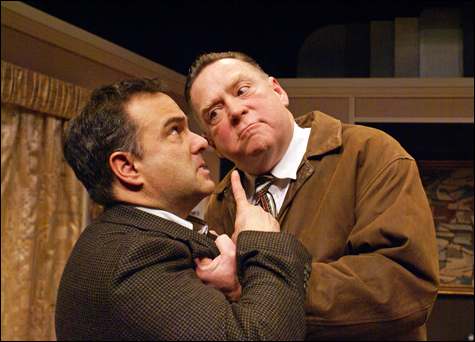
KEEPING THEIR COOL Slapsticking Gone With the Wind. |
A lot of folks still consider the 1939 film Gone With the Wind to be the best loved and most iconic American movie of all time — a classic national story of struggle and perseverance. Others might call it an American icon for less flattering reasons, i.e., how blithely it romanticizes some pretty problematic racial history. And yet another way to look at the movie and its making is as the quintessence of Hollywood: The last-minute firings, hirings, and general histrionics behind Gone With the Wind are legendary among film buffs. It's this last angle that's the primary concern of Ron Hutchinson's Moonlight and Magnolias, a comedic romp about the monumental difficulties of making Margaret Mitchell's humongous best-seller into a decent film.
In fact, producer David O. Selznick (Stephen Underwood) is so unhappy with how things are going that he's put the entire production on hold, at a cost of approximately $750,000 a day. In the meantime, he's pulled director Victor Fleming (Tony Reilly) off of The Wizard of Oz to take over for George Cuckor (who has "pansified it," Selznick complains), and hauled in famed screenwriter Ben Hecht (Brent Askari) to salvage the script. Trouble is, Hecht hasn't read the novel. Thus the central premise of the play: Selznick locks Hecht and Fleming in his office (which set designer Craig Robinson renders nicely in understated mauve, beige, and dark leather, with some Art Deco touches) for five days, during which progressively fevered hours the producer and director act out Mitchell's storyline for Hecht. To keep their brains sharp, the men are kept to a strict diet of peanuts and bananas delivered by Selznick's secretary Miss Poppenghul (Lynne McGhee, who's a hoot).
What follows are a lot of slapstick, verbal comedy of the "Who's on first?" variety, and the spectacle of watching generally respectable film guys degenerate into moaning, sleep-deprived creatures wearing their clothes very badly. These agonized men are well-cast, and contrast entertainingly with each other physically: Underwood's lanky Selznick towers over the other two, and Reilly's burly, brawl-happy Fleming strikes quite a figure against Askari's shorter, fast-talking Hecht. Their portrayals play up the characters' types: the neurotic producer; the coarse and carnal director; the bitter, class-conscious writer. Sometimes the comic timing seems less whiz-bang than usual among these actors, though this might also be due to the script, which tends to repeat itself and hammer on the same chords fairly regularly.
The show is funniest when it cleverly sends up the premise, plot line, and characters with which the men are forced to work. Fleming notes that Scarlett O'Hara "doesn't have enough class to be a hooker," and reminds Hecht that they need to "ham up" the story to "make 'em forget what piffle it is." Askari has a particularly good little monologue in which he gives an exasperated oversimplification of the basic plot points — going away, coming back, wanting this man, not wanting that one, marrying another one, and so forth. And wow, how about that ending?